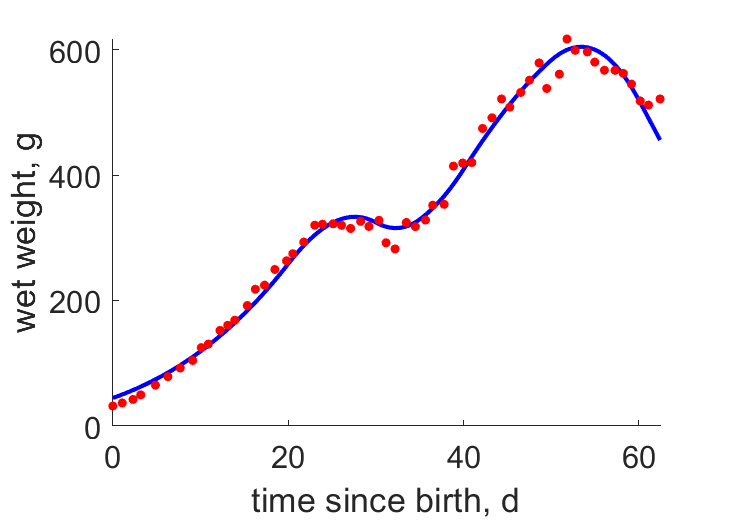Predictions & Data for this entry
| Model: std | climate: MB, MC | migrate: Ms | phylum: |
| COMPLETE = 2.5 | ecozone: MAS, MPSE | food: biCvf, biCi, biSi, biSv | class: |
| MRE = 0.031 | habitat: 0iMm, biMc | gender: Dg | order: |
| SMSE = 0.002 | embryo: Tnsfm | reprod: O | family: |
Zero-variate data
| Data | Observed | Predicted | (RE) | Unit | Description | Reference |
|---|---|---|---|---|---|---|
| ab | 30 | 32.54 | (0.0846) | d | age at birth | avibase |
| tx | 55 | 54.71 | (0.005352) | d | time since birth at fledging | avibase |
| tp | 165 | 156.4 | (0.05242) | d | time since birth at puberty | guess |
| tR | 1095 | 1095 | ( 0) | d | time since birth at 1st brood | guess |
| am | 1.095e+04 | 1.099e+04 | (0.003459) | d | life span | guess |
| Ww0 | 45 | 42.24 | (0.06131) | g | initial wet weight | avibase |
| Wwb | 32 | 32.43 | (0.01358) | g | wet weight at birth | guess |
| Wwi | 838 | 875.6 | (0.04483) | g | ultimate wet weight | avibase |
| Wwim | 735 | 734.3 | (0.0009775) | g | ultimate wet weight | WillCoop1984 |
| Ri | 0.006575 | 0.006398 | (0.02694) | #/d | maximum reprod rate | avibase |
Uni- and bivariate data
| Data | Figure | Independent variable | Dependent variable | (RE) | Reference |
|---|---|---|---|---|---|
| tW |  | time since birth | wet weight | (0.03721) | Jone1963 |
Pseudo-data at Tref = 20°C
| Data | Generalised animal | Chionis albus | Unit | Description |
|---|---|---|---|---|
| v | 0.02 | 0.02757 | cm/d | energy conductance |
| p_M | 18 | 528.9 | J/d.cm^3 | vol-spec som maint |
| k_J | 0.002 | 0.0223 | 1/d | maturity maint rate coefficient |
| k | 0.3 | 0.3087 | - | maintenance ratio |
| kap | 0.8 | 0.9593 | - | allocation fraction to soma |
| kap_G | 0.8 | 0.8001 | - | growth efficiency |
| kap_R | 0.95 | 0.95 | - | reproduction efficiency |
Discussion
- Feeding is slightly reduced towards end of nestling period
- Long tp cannot be captured by std model
- males are assumed to differ from females by {p_Am} only
- mod_1: v is reduced
- mod_2: Pseudo-data point k is used, rather than k_J; Data set tp and parameter t_R are added, the latter replacing clutch interval t_N. Postnatal T is based on PrinPres1991, see get_T_Aves. See further the revision page, theme puberty
Bibliography